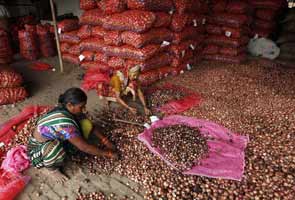 New Delhi, Aug 14: Much to the discomfort of consumers, onion prices today touched Rs 80 per kg in most retail markets in the national capital despite normal supply in the wholesale markets.
New Delhi, Aug 14: Much to the discomfort of consumers, onion prices today touched Rs 80 per kg in most retail markets in the national capital despite normal supply in the wholesale markets.
Wholesale price of onion have increased by Rs five to Rs 50-55 per kg in Azadpur mandi, according to the Onion Merchant Traders Association.
Onion supply to the city, which comes from Maharashtra, Rajasthan and Madhya Pradesh, is normal at 12,000 quintals in Azadpur, Asia's largest wholesale market, it added.
At Mother Dairy outlets, onions are being sold at Rs 55-60 per kg, while local vendors are selling it at 70-80 per kg depending upon the quality and location.
Onion Merchant Traders Association President Surendra Budhiraj attributed the rise in wholesale price of onion in Delhi to increase in prices of the bulb crop in Maharashtra, the country's largest onion producing state.
At Lasalgaon in Nashik, prices rose slightly to Rs 46 per kg today from Rs 45 a kg even as supplies remained normal, National Horticultural Research and Development Foundation (NHRDF) Director R P Gupta said.
Prices are expected to cool down in the first week of September once supplies from onion Andhra Pradesh and Karnataka increases, he added.
India has exported 6.39 lakh tonnes during April-July period of this fiscal compared with 6.94 lakh tonnes in the year-ago period. Production stood at 16.6 million tonnes in 2012-13.
At the Kolkata market, onion prices jumped to Rs 70 a kg for the best quality in retail markets, keeping pace with the national trend.
The official wholesale price of onions in markets in the metropolis has crossed Rs 2000 per bag (40 kg) or Rs 50 a kg and as a result the retail price of the best quality of the vegetable is hovering at Rs 65-70 a kg, traders said.
"The wholesale onion price which was Rs 15 a kg during the same time last year has spurted unexpectedly to Rs 50 a kg this year," trader and adviser to state agri-marketing department Shibu Malakar said.
"Based on the current trend, prices will remain firm unless there is a ban on onion export," he said.
Rain and production shortfall has been blamed for rise in price of onion. West Bengal is a key consumer of onion.
Traders said wholesale supply to the market in the city shrank by 50 per cent from states which supplied it.
Malakar said there was little the state government could do on the price unless it decided to sell directly to consumers at a subsidised price.
Consumers will have to bear till September end when the Kharif onion would hit the market.
He also said there was no major report of hoarding of the perishable commodity so far.






Comments
Add new comment